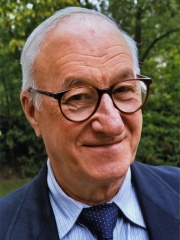
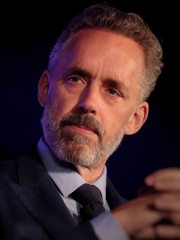

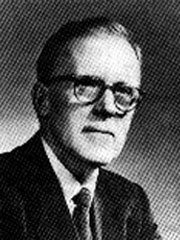

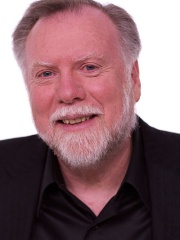
The Most Famous
PSYCHOLOGISTS from Canada
This page contains a list of the greatest Canadian Psychologists. The pantheon dataset contains 235 Psychologists, 7 of which were born in Canada. This makes Canada the birth place of the 9th most number of Psychologists behind Russia, and Poland.
Top 7
The following people are considered by Pantheon to be the most legendary Canadian Psychologists of all time. This list of famous Canadian Psychologists is sorted by HPI (Historical Popularity Index), a metric that aggregates information on a biography's online popularity.

1. Albert Bandura (1925 - 2021)
With an HPI of 76.67, Albert Bandura is the most famous Canadian Psychologist. His biography has been translated into 58 different languages on wikipedia.
Albert Bandura (4 December 1925 – 26 July 2021) was a Canadian-American psychologist and professor of social science in psychology at Stanford University, who contributed to the fields of education and to the fields of psychology, e.g. social cognitive theory, therapy, and personality psychology, and influenced the transition between behaviorism and cognitive psychology. Bandura also is known as the originator of the social learning theory, the social cognitive theory, and the theoretical construct of self-efficacy, and was responsible for the theoretically influential Bobo doll experiment (1961), which demonstrated the conceptual validity of observational learning, wherein children would watch and observe an adult beat a doll, and, having learned through observation, the children then beat a Bobo doll. A 2002 survey ranked Bandura as the fourth most frequently cited psychologist of all time, behind B. F. Skinner, Sigmund Freud, and Jean Piaget. In April 2025, Bandura became the first psychologist with more than a million Google Scholar citations. During his lifetime, Bandura was widely described as the greatest living psychologist, and as one of the most influential psychologists of all time.

2. Jordan Peterson (b. 1962)
With an HPI of 75.52, Jordan Peterson is the 2nd most famous Canadian Psychologist. His biography has been translated into 67 different languages.
Jordan Bernt Peterson (born 12 June 1962) is a Canadian psychologist, author, and media commentator. He received widespread attention in the late 2010s for his views on cultural and political issues. Often described as conservative, Peterson self-identifies as a classical liberal and traditionalist. Born and raised in Alberta, he obtained two bachelor's degrees, one in political science and one in psychology from the University of Alberta, and then a PhD in clinical psychology from McGill University. After researching and teaching at Harvard University, he returned to Canada in 1998 and became a professor of psychology at the University of Toronto. In 1999, he published his first book, Maps of Meaning: The Architecture of Belief, which became the basis for many of his subsequent lectures. The book combined psychology, mythology, religion, literature, philosophy and neuroscience to analyze systems of belief and meaning. In 2016, Peterson released a series of videos on YouTube criticizing a proposed federal law, Bill C-16, that would prohibit discrimination against gender identity and expression. Peterson argued that the bill would make the use of certain gender pronouns compelled speech, and related this argument to a general critique of "political correctness" and identity politics, receiving significant media coverage and attracting both support and criticism. The bill became law in 2017. Peterson has been widely criticized by climate scientists for denying the scientific consensus on climate change and giving a platform to climate-change deniers. In 2018, he paused both his clinical practice and teaching duties and published his second book, 12 Rules for Life: An Antidote to Chaos. Promoted with a world tour, it became a bestseller in several countries. In 2019 and 2020, Peterson suffered health issues related to benzodiazepene dependence. In 2021, he published his third book, Beyond Order: 12 More Rules for Life, resigned from the University of Toronto, and returned to podcasting. In 2022, Peterson became chancellor of the newly launched Ralston College, a private, unaccredited, liberal arts college in Savannah, Georgia, United States. His various lectures and conversations, available mainly on YouTube and podcasts, have garnered millions of views and plays.

3. Eric Berne (1910 - 1970)
With an HPI of 71.48, Eric Berne is the 3rd most famous Canadian Psychologist. His biography has been translated into 35 different languages.
Eric Berne (May 10, 1910 – July 15, 1970) was a Canadian-born psychiatrist who created the theory of transactional analysis as a way of explaining human behavior. Berne's theory of transactional analysis was based on the ideas of Freud and Carl Jung but was distinctly different. Freudian psychotherapists focused on talk therapy as a way of gaining insight to their patient's personalities. Berne believed that insight could be better discovered by analyzing patients’ social transactions.

4. Donald O. Hebb (1904 - 1985)
With an HPI of 65.34, Donald O. Hebb is the 4th most famous Canadian Psychologist. His biography has been translated into 36 different languages.
Donald Olding Hebb (July 22, 1904 – August 20, 1985) was a Canadian psychologist who was influential in the area of neuropsychology, where he sought to understand how the function of neurons contributed to psychological processes such as learning. He is best known for his theory of Hebbian learning, which he introduced in his classic 1949 work The Organization of Behavior. He has been described as the father of neuropsychology and neural networks. A Review of General Psychology survey, published in 2002, ranked Hebb as the 19th most cited psychologist of the 20th century. His views on learning described behavior and thought in terms of brain function, explaining cognitive processes in terms of connections between neuron assemblies.
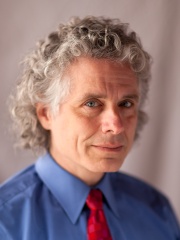
5. Steven Pinker (b. 1954)
With an HPI of 62.60, Steven Pinker is the 5th most famous Canadian Psychologist. His biography has been translated into 50 different languages.
Steven Arthur Pinker (born September 18, 1954) is a Canadian cognitive psychologist, psycholinguist, popular science author, and public intellectual. He is an advocate of evolutionary psychology and the computational theory of mind. Pinker is the Johnstone Family Professor of Psychology at Harvard University. Steven Pinker specializes in visual cognition and developmental linguistics, as well as a number of experimental topics. Pinker has written two technical books that proposed a general theory of language acquisition. In particular, his work with Alan Prince posited that children use default rules sometimes in error but are obliged to learn irregular forms one by one. Pinker is the author of nine books for general audiences. The Language Instinct (1994), How the Mind Works (1997), Words and Rules (2000), The Blank Slate (2002), and The Stuff of Thought (2007) posit that language is an innate behavior shaped by natural selection and adapted to our communication needs. Pinker's The Sense of Style (2014) is a general language-oriented style guide. Pinker's book The Better Angels of Our Nature (2010) posits that violence in human societies has generally declined over time, and identifies six major trends and five historical forces of this decline. Enlightenment Now (2018) further argues that the human condition has generally improved over recent history because of reason, science, and humanism. The nature and importance of reason is also discussed in his book Rationality: What It Is, Why It Seems Scarce, Why It Matters (2021). In 2004, Pinker was named in Time's "The 100 Most Influential People in the World Today", and in 2005, 2008, 2010, and 2011 in Foreign Policy's list of "Top 100 Global Thinkers". He was also included in Prospect Magazine's top 10 "World Thinkers" in 2013. He has won awards from the American Psychological Association, the National Academy of Sciences, the Royal Institution, the Cognitive Neuroscience Society, and the American Humanist Association. He has served on the editorial boards of a variety of journals and on the advisory boards of several institutions. Pinker was also the chair of the Usage Panel of the American Heritage Dictionary from 2008 to 2018.

6. Robert D. Hare (b. 1934)
With an HPI of 61.37, Robert D. Hare is the 6th most famous Canadian Psychologist. His biography has been translated into 17 different languages.
Robert D. Hare (born 1 January 1934) is a Canadian forensic psychologist, known for his research in the field of criminal psychology. He is a professor emeritus of the University of British Columbia where he specializes in psychopathology and psychophysiology. Hare developed the Hare Psychopathy Checklist (PCL-Revised), used to assess cases of psychopathy. He advises the FBI's Child Abduction and Serial Murder Investigative Resources Center (CASMIRC) and consults for various British and North American prison services.

7. Gordon Neufeld (b. 1947)
With an HPI of 55.59, Gordon Neufeld is the 7th most famous Canadian Psychologist. His biography has been translated into 16 different languages.
Gordon Neufeld (born 1946) is a developmental psychologist from Vancouver, British Columbia. He is the author of the book Hold on to Your Kids: Why Parents Need to Matter More Than Peers (co-authored with Canadian physician Gabor Maté).
People
Pantheon has 7 people classified as Canadian psychologists born between 1904 and 1962. Of these 7, 4 (57.14%) of them are still alive today. The most famous living Canadian psychologists include Jordan Peterson, Steven Pinker, and Robert D. Hare. The most famous deceased Canadian psychologists include Albert Bandura, Eric Berne, and Donald O. Hebb.
Living Canadian Psychologists
Go to all RankingsJordan Peterson
1962 - Present
HPI: 75.52
Steven Pinker
1954 - Present
HPI: 62.60
Robert D. Hare
1934 - Present
HPI: 61.37
Gordon Neufeld
1947 - Present
HPI: 55.59
Deceased Canadian Psychologists
Go to all RankingsAlbert Bandura
1925 - 2021
HPI: 76.67
Eric Berne
1910 - 1970
HPI: 71.48
Donald O. Hebb
1904 - 1985
HPI: 65.34
Overlapping Lives
Which Psychologists were alive at the same time? This visualization shows the lifespans of the 3 most globally memorable Psychologists since 1700.

